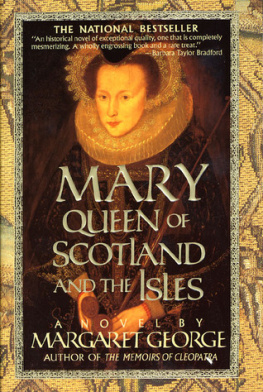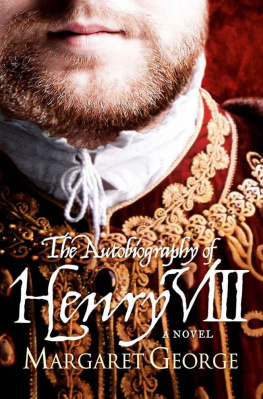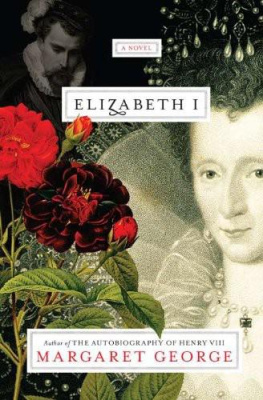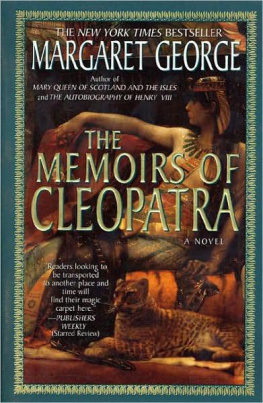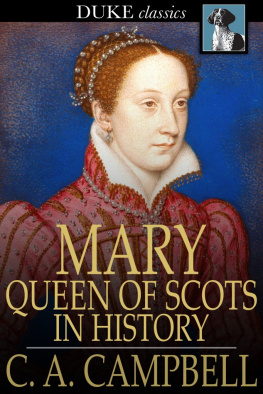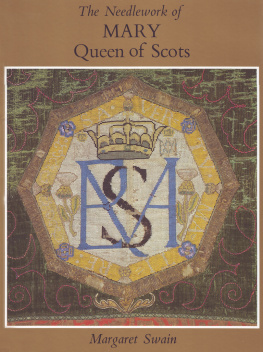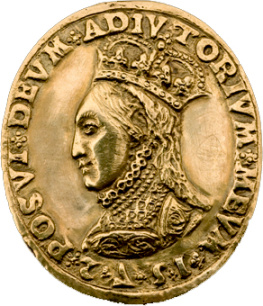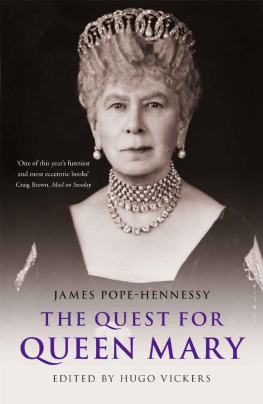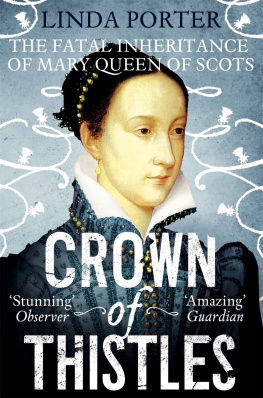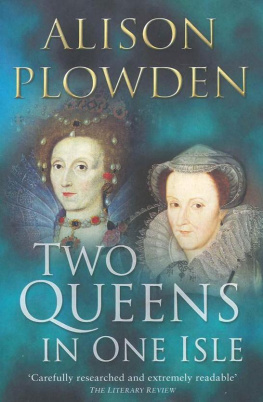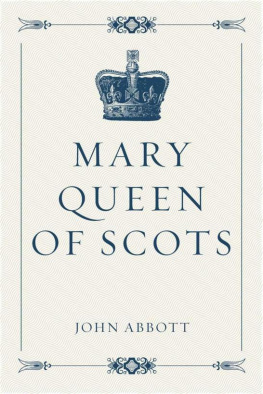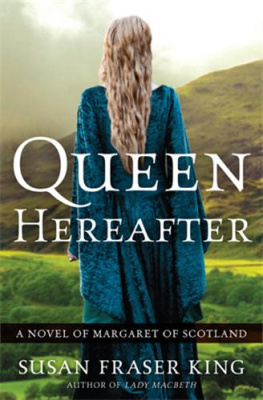Margaret George - Mary Queen of Scotland and the Isles
Here you can read online Margaret George - Mary Queen of Scotland and the Isles full text of the book (entire story) in english for free. Download pdf and epub, get meaning, cover and reviews about this ebook. year: 1992, publisher: St. Martins Press, genre: Art. Description of the work, (preface) as well as reviews are available. Best literature library LitArk.com created for fans of good reading and offers a wide selection of genres:
Romance novel
Science fiction
Adventure
Detective
Science
History
Home and family
Prose
Art
Politics
Computer
Non-fiction
Religion
Business
Children
Humor
Choose a favorite category and find really read worthwhile books. Enjoy immersion in the world of imagination, feel the emotions of the characters or learn something new for yourself, make an fascinating discovery.
- Book:Mary Queen of Scotland and the Isles
- Author:
- Publisher:St. Martins Press
- Genre:
- Year:1992
- Rating:4 / 5
- Favourites:Add to favourites
- Your mark:
- 80
- 1
- 2
- 3
- 4
- 5
Mary Queen of Scotland and the Isles: summary, description and annotation
We offer to read an annotation, description, summary or preface (depends on what the author of the book "Mary Queen of Scotland and the Isles" wrote himself). If you haven't found the necessary information about the book — write in the comments, we will try to find it.
Mary Queen of Scotland and the Isles — read online for free the complete book (whole text) full work
Below is the text of the book, divided by pages. System saving the place of the last page read, allows you to conveniently read the book "Mary Queen of Scotland and the Isles" online for free, without having to search again every time where you left off. Put a bookmark, and you can go to the page where you finished reading at any time.
Font size:
Interval:
Bookmark:
Mary Queen of Scotland and the Isles by Margaret George
Also by Margaret George
THE AUTOBIOGRAPHY OF HENRY V11I
MARY
QUEEN OF SCOTLAND AND THE ISLES
A Novel
MARGARET GEORGE
MACMILLAN LONDON
1 IS
With thanks to: my daughter, Alison Kaufman, and my husband, Paul Kaufman, for living with Mary for four years; my sister, Rosemary George, for historical tidbits and oddities; my mother, Dean George, for humour; my grandparents Charles and Lois Grain for being my Mme. Rallay; my medievalist friend, Lynn Courtenay, for source material; my writer friend Dick Huff for creative inspiration. And finally to my editor, Hope Dellon, who was "present at the creation" of both Henry VIII and Mary, and has helped mightily at every stage; and my agent, Jacques de Spoelberch, who believed in me from the beginning.
ACKNOWLEDGEMENTS
Poem, "Nature and art..." by Joachim du Bellay, on page 63, translated from the French, as it appears in The Queen of Scots by Stefan Zweig, translated from the German by Cedar and Eden Paul.
London'Cassell, 1935. Poem, "The Tongue of Hercules..." by Joachim du Bellay, on page 63, translated from the French and quoted in The Love Affairs of Mary Queen of Scots: A Political History, by Martin Hume. London:
Eveleigh Nash & Grayson Limited. Poem attributed to Mary Queen of Scots, on page 105, translated from the French and quoted in Lives of the Queens of Scotland and English Princesses, by Agnes Strickland, Vol. III. Edinburgh and London:
William Blackwood and Sons, 1861. Elegie o Marie Stuart by Pierre de Ronsard, on page 112, translated from the French by Helen Smailes in
The Queen's Image, by Helen Smailes and Duncan Thomson, for the Scottish National Portrait
Gallery, Copyright 1987 by The Trustees of the National Galleries of Scotland. "Four stages of prayer" on pages 702-704, by Father Albert Haase, Madison, Wisconsin, 1989. Poem on page 801 and prayer on page 842, both attributed to Mary Queen of Scots; translations from the
French and Latin respectively copyright 1974 and 1976 by Caroline Bingham, as quoted in Royal
Swan Papers X: The Poems of Mary Queen of Scots, by Caroline Bingham, the Royal Stuart Society,
1976.
"Meditation on the Two Thieves" on pages 856-857, by Scott George, Oslo, Norway 1963. Scottish ballads, from the collection of Francis James Child.
First published 1992 by St. Martin's Press, New York, USA
First published in Great Britain 1992 by Macmillan London a division of Pan Macmillan Publishers Limited
Cavaye Place London SW10 9PG
and Basingstoke
Associated companies throughout the world
ISBN 0333 58477 5
Copyright C Margaret George 1992 The right of Margaret George to be identified as the author of this
work has been asserted by her in accordance with the Copyright, Designs and Patents Act 1988.
All rights reserved. No reproduction, copy or transmission of this publication may be made without written permission. No paragraph of this publication may be reproduced,
copied or transmitted save with written permission or in accordance with the provisions of the Copyright Act 1956
(as amended). Any person who does any un authorised act in relation to this publication may be liable to criminal prosecution and civil claims for damages
135798642 A C1P catalogue record for this book is available from the British Library
Printed and bound in Great Britain by Mackays of Chatham plc, Chatham, Kent
To SCOTT GEORGE 1920-1989
Beloved father, friend, and teacher
To see the eclipses of Sun and Moon; to see the capture of wild elephants and snakes; and to see the poverty of the wise, is to see that the power of fate is always supreme.
Hindu proverb
In My End Is My Beginning England, 1587
In the deepest part of the night, when all the candles save one had been put out and everyone lay quiet, the woman crossed silently to her desk and sat down. She put that one candle at her right hand, and spread out a piece of paper as slowly as possible across the desktop, so as to make no noise. She held its left side down with her hand a white hand with long, slender fingers, which the French poet Ronsard had once described as "a tree with uneven branches." The hand looked young, as if it belonged to a virgin of fifteen. From across the room, with only one candle for illumination, the woman's face looked as young as the hand. But up closer, although the outlines of the beauty were still there, within the frame of the old loveliness there were lines and bumps and sags. The skin no longer stretched taut against the high cheekbones, the long, imperious nose, the almond-shaped eyes. It lay softly against them, tracing and revealing every hollow.
She rubbed her eyes, which were heavy-lidded and had traces of exhaustion under them, with that incongruously slender-fingered, elegantly ringed hand. Sighing, she dipped her pen in ink and began to write.
To Henri III, the Most Christian King of France.
8 February 1587.
Monsieur m o n beau frere, est ant par la permission de Dieu
Royal brother, having by God's will, for my sins I think, thrown myself into the power of the Queen my cousin, at whose hands I have suffered much for almost twenty years, I have finally been condemned to death by her and her Estates. I have asked for my papers, which they have taken away, in order that I might make my will, but I have been unable to recover anything of use to me, or even get leave either to make my will freely or to have my body conveyed after my death, as I would wish, to your kingdom where I had the honour to be queen, your sister and old ally.
Tonight, after dinner, I have been advised of my sentence: I am to be executed like a criminal at eight in the morning. I have not had time to give you a full account of everything that has happened, but if you will listen to my doctor and my other unfortunate servants, you will learn the truth, and how, thanks be to God, I scorn death and vow that I meet it innocent of any crime, even if I were their subject. The Catholic faith and the assertion of my God-given right to the English throne are the two issues on which I am condemned.
She stopped and stared ahead, as if her mind had suddenly ceased to form words, or she had run out of them. The French language was soothing, lulling. Even terrible things did not sound so heinous in French. Her mind could not, dared not, form them in Scots.
"Ce parteur & sa compaignie la plus part de vos subjectz ..."
The bearer of this letter and his companions, most of them your subjects, will testify to my conduct at my last hour. It remains for me to beg Your Most Christian Majesty, my brother-in-law and old ally, who have always protested your love for me, to give proof now of your goodness on all these points: firstly by charity, in paying my unfortunate servants the wages due them this is a burden on my conscience that only you can relieve: further, by having prayers offered to God for a queen who has borne the title Most Christian Queen of France, and who dies a Catholic, stripped of all her possessions.
I have taken the liberty of sending you two precious stones, talismans against illness, trusting you will enjoy good health and a long and happy life. Accept them from your loving sister-in-law, who, as she dies, bears witness of her warm feelings for you. Give instructions, if it please you, that for my soul's sake part of what you owe me should be paid, and that for the sake of Jesus Christ, to whom I shall pray for you tomorrow as I die, I be left enough to found a memorial mass and give the customary alms.
Wednesday, at two in the morning.
Your most loving and most true sister,
Queen of Scotland
She put down the pen, blinked once. Then she carefully put two small books on the paper to hold it down. Each movement was delicate, but weary. The fine, slender fingers stretched out once, then rested. She blew out the candle.
Next pageFont size:
Interval:
Bookmark:
Similar books «Mary Queen of Scotland and the Isles»
Look at similar books to Mary Queen of Scotland and the Isles. We have selected literature similar in name and meaning in the hope of providing readers with more options to find new, interesting, not yet read works.
Discussion, reviews of the book Mary Queen of Scotland and the Isles and just readers' own opinions. Leave your comments, write what you think about the work, its meaning or the main characters. Specify what exactly you liked and what you didn't like, and why you think so.

